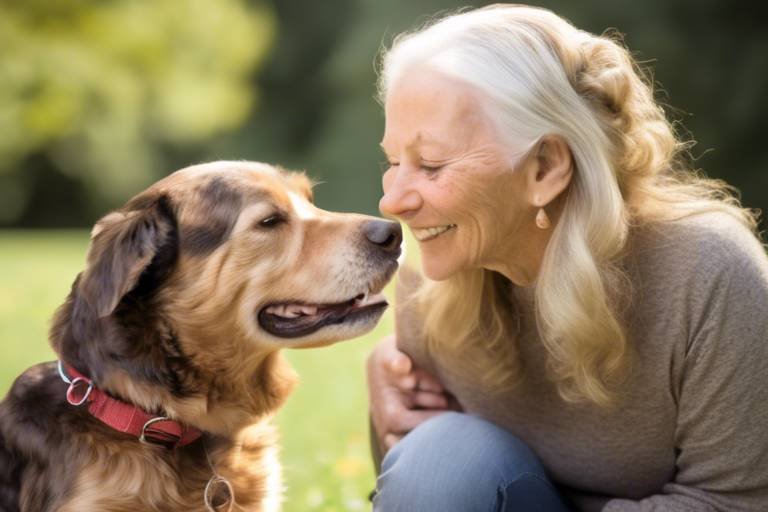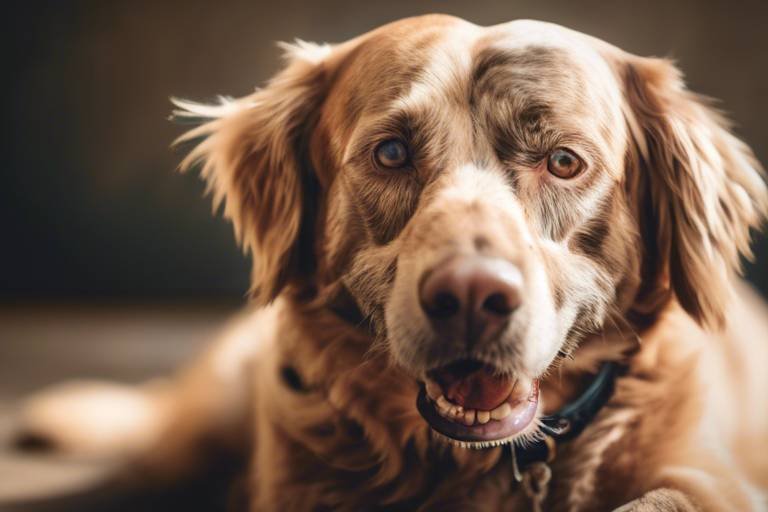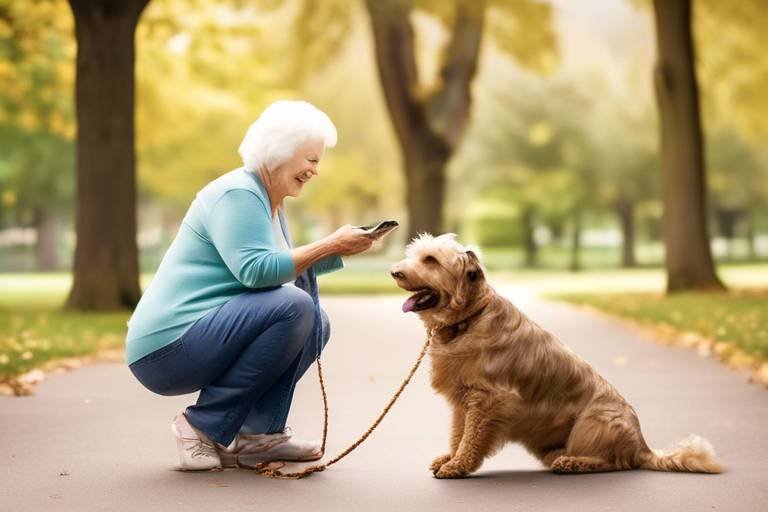The Importance of Bonding with Your Senior Pet
As our furry companions age, they often become more than just pets; they become cherished members of our family. The bond we share with our senior pets is not only vital for their emotional well-being but also for our own. As they transition into their golden years, senior pets require a unique kind of attention and love, making it essential to understand and nurture this relationship. Building a strong connection with your senior pet can significantly enhance their quality of life, ensuring they feel safe, loved, and valued. This article delves into the significance of bonding with your senior pet, emphasizing their unique needs and the mutual benefits of companionship.
As pets age, their physical and emotional needs evolve. It's like watching a child grow up—every stage comes with its own set of requirements. Recognizing these shifts can dramatically improve their quality of life and strengthen the bond between you and your furry friend. Senior pets may experience changes in mobility, vision, and even their social behaviors. They may not be as playful as they once were, but that doesn’t mean they don’t crave interaction and love. Understanding their needs can help you provide the best care possible, ensuring they feel secure and happy in their environment.
Building a strong relationship with senior pets can lead to improved mental health for both the pet and owner. When you invest time in your senior pet, you’re not just giving them love; you’re fostering companionship that can reduce feelings of loneliness during their twilight years. Imagine coming home to a wagging tail or a soft purr; it’s these moments that remind us of the joy pets bring into our lives. The emotional support that comes from this relationship can be incredibly beneficial, creating a sense of purpose and fulfillment for both you and your pet.
Senior pets may face various health challenges, such as arthritis, dental issues, or even more serious conditions like diabetes. Understanding these issues is crucial for providing appropriate care and support. It’s like being a detective—observing their behavior, noting changes, and making sure they get the right treatment. By addressing their health needs, you not only enhance their well-being but also strengthen your bond through shared experiences and mutual trust. Regular check-ups and being attentive to their needs can create a nurturing environment where your pet feels safe and loved.
Tailoring your senior pet's diet to their specific health conditions can significantly impact their well-being. Just like humans, pets require different nutrients as they age. It’s essential to consult your veterinarian to create a diet plan that caters to their needs. This small act of love demonstrates your commitment to their health and can strengthen your emotional connection. For instance, incorporating joint supplements or adjusting their calorie intake can make a world of difference in their energy levels and overall happiness.
Routine vet visits are crucial for monitoring your senior pet's health. These check-ups not only ensure their physical well-being but also provide opportunities for bonding through shared experiences. Think of it as a mini-adventure for your pet! A trip to the vet can be less stressful if you prepare them with love and reassurance. Plus, it’s a chance for you to learn more about their health, ensuring you’re equipped to provide the best care possible.
Engaging with your senior pet through play and companionship fosters emotional bonds. Understanding their preferences can make interactions more enjoyable and fulfilling for both of you. Whether it’s a gentle game of fetch or simply cuddling on the couch, these moments are invaluable. They remind us that love knows no age. The emotional connection you build will not only make your pet feel cherished but will also bring immense joy and comfort to your life.
Participating in tailored activities can enhance your relationship with your senior pet. Finding suitable games or routines helps keep them mentally and physically stimulated while deepening your connection. Remember, it’s not about how vigorous the activity is but rather the quality of the time spent together. Simple activities like short walks, gentle play, or even just sitting together can create lasting memories and strengthen your bond.
Incorporating light exercise into your senior pet's daily routine can improve their physical health and provide opportunities for bonding through shared activities. Think of it as a dance; you lead, and they follow, creating a rhythm that works for both of you. Gentle walks or slow-paced games can keep them engaged and active, helping to maintain their mobility and happiness.
Providing comfort through gentle affection and attention helps reassure your senior pet, fostering a sense of security and deepening your emotional connection. Just like a warm hug can make us feel safe, your pet thrives on your love and attention. Regular snuggles, soft words, and gentle strokes can significantly enhance their overall happiness. Remember, your affection is the best medicine they could ask for.
- What are the signs that my pet is aging? Look for changes in mobility, appetite, energy levels, and behavior. Regular vet check-ups can help monitor these changes.
- How can I improve my senior pet's quality of life? Tailor their diet, ensure regular vet visits, and engage in gentle exercise and bonding activities.
- Is it too late to bond with my senior pet? Absolutely not! It’s never too late to build a connection. Start with simple interactions and observe what they enjoy.

Understanding Your Senior Pet's Needs
As our beloved furry companions age, it's essential to recognize that their physical and emotional needs undergo significant changes. Just like humans, senior pets experience shifts that can affect their daily lives, behavior, and overall well-being. Understanding these changes is crucial for improving their quality of life and forging a deeper bond between you and your pet. Have you ever noticed how your once-energetic pup now prefers lounging on the couch? This is just one of the many signs that your pet is entering their golden years, and it’s a great reminder for us to adapt our care to meet their evolving needs.
One of the most noticeable changes in senior pets is their activity level. While younger pets may be full of energy and constantly seeking playtime, older pets often slow down. This doesn’t mean they don’t enjoy play; rather, they might prefer gentler activities that suit their current capabilities. Incorporating light exercise, such as short walks or gentle play, can keep them active without overexerting them. Remember, a tired pet is often a happy pet, but the key is to find that balance!
Moreover, senior pets may experience various health issues, including arthritis, dental problems, and sensory decline. These challenges can lead to discomfort and even behavioral changes. For instance, if your pet seems more irritable or withdrawn, it might be due to pain or discomfort they’re experiencing. Paying attention to these signs is essential. It’s not just about recognizing the physical symptoms; it’s about understanding how these changes impact their emotional state. After all, our pets rely on us to be their advocates.
Nutrition also plays a pivotal role in the well-being of senior pets. As they age, their dietary needs shift, and they may require specialized diets that cater to their health conditions. For example, pets with kidney issues may benefit from a diet lower in protein, while those with joint problems might need supplements to support their mobility. Tailoring their diet not only enhances their health but also shows your commitment to their happiness. It’s like preparing a special meal for a loved one; it’s an act of love that strengthens your bond.
Lastly, it’s crucial to provide a safe and comfortable environment for your senior pet. As their senses decline, they may become more anxious or fearful. Create a cozy space where they can retreat when they need rest. Consider using soft bedding, ensuring easy access to food and water, and keeping their favorite toys nearby. A little extra effort goes a long way in making them feel secure and loved.
In summary, understanding your senior pet's needs involves recognizing their physical changes, adapting their diet, and creating a nurturing environment. By doing so, you not only enhance their quality of life but also deepen the emotional connection you share. Remember, your senior pet may be aging, but with the right care and attention, their twilight years can be filled with joy and companionship!

Benefits of Bonding with Senior Pets
Building a strong relationship with your senior pet is not just a nice-to-have; it’s an essential part of their well-being and yours. When you invest time in bonding, you unlock a treasure trove of benefits that can enhance the quality of life for both of you. Think of it as nurturing a fine wine—over time, the flavors deepen and become more complex, just like your connection with your furry friend. But what exactly do you gain from this bond?
First and foremost, bonding with your senior pet can lead to improved mental health for both of you. Imagine coming home after a long day and being greeted by a wagging tail or a gentle purr. That moment of joy can lift your spirits and reduce feelings of loneliness. According to studies, pet owners often experience lower levels of stress and anxiety, thanks to the companionship that their furry friends provide. These moments of connection can be especially crucial during your pet's twilight years when they may become more dependent on your presence.
Another significant benefit is the reduction of behavioral issues. Senior pets sometimes exhibit changes in behavior due to age-related challenges such as anxiety or confusion. By spending quality time together, you can better understand their needs and preferences, which can help in addressing these issues. For instance, if your senior dog seems restless, a simple game of fetch or a gentle walk can help them release pent-up energy. This not only strengthens your bond but also enhances their overall well-being.
Moreover, bonding activities can lead to improved physical health. Engaging in regular, gentle exercise routines can keep your senior pet active and healthy. Whether it's a leisurely stroll around the block or some light playtime indoors, these activities promote physical fitness and can even help manage weight, which is crucial for senior pets prone to obesity. It’s a win-win situation: you both get to enjoy some exercise while deepening your emotional connection.
In addition to physical benefits, there’s a profound emotional connection that develops through shared experiences. When you take the time to engage with your senior pet, whether through cuddles, grooming, or quiet moments together, you create a sense of security and trust. This emotional bond can be incredibly comforting for both of you. It’s like having a warm blanket on a cold day—soothing and reassuring.
Lastly, let’s not overlook the incredible joy and laughter that comes from simply being together. Whether it’s a funny quirk your pet has or a silly game you play, these moments create lasting memories. They fill your life with joy and serve as a reminder of the special relationship you share. After all, pets have a unique way of bringing happiness into our lives, often when we need it the most.
In summary, the benefits of bonding with your senior pet are multifaceted, impacting both mental and physical health. From reducing loneliness to improving behavioral issues and fostering emotional connections, the time you spend together is invaluable. So, why not take a moment today to engage with your furry friend? You both deserve it!
- How can I tell if my senior pet is happy? Look for signs like wagging tails, playful behavior, and a relaxed posture. A happy pet will also seek your company and show interest in activities.
- What activities are best for senior pets? Gentle walks, puzzle toys, and light play sessions are excellent options. Always consider your pet's health status before engaging in new activities.
- How often should I bond with my senior pet? Aim for daily interactions, even if they are short. Consistency will help strengthen your bond over time.
Physical Health Considerations
As our beloved pets age, they often face a myriad of physical health challenges that can affect their overall well-being. Understanding these issues is crucial for pet owners who want to provide the best care possible. Senior pets may experience conditions such as arthritis, dental disease, obesity, or even heart problems. Each of these ailments can significantly impact their quality of life, but with the right knowledge and care, you can help your furry friend navigate their golden years with grace and comfort.
For instance, arthritis is one of the most common issues in older dogs and cats. It can make movement painful and difficult, leading to a decrease in activity levels. As a loving pet owner, you might notice your senior pet hesitating to jump onto their favorite couch or taking longer to get up after a nap. This is not just a sign of aging; it’s a call for you to be their advocate. Regular gentle exercises, such as short walks or light play, can help keep their joints flexible and reduce stiffness.
Additionally, dental health is often overlooked but plays a significant role in your pet's overall health. Senior pets are prone to periodontal disease, which can lead to pain, tooth loss, and even systemic issues if bacteria enter the bloodstream. Regular dental check-ups and cleanings, along with at-home dental care, can make a world of difference in your pet’s comfort and health.
Moreover, obesity is another pressing concern for senior pets. As their metabolism slows down, they may not be as active as they once were, leading to weight gain. This extra weight can exacerbate existing health issues, such as arthritis or heart disease. It’s essential to monitor their diet closely and consult with your veterinarian to create a tailored nutrition plan that meets their specific needs.
To help you track these health considerations, here’s a simple table that outlines common health issues in senior pets along with their potential impacts:
| Health Issue | Potential Impact | Care Tips |
|---|---|---|
| Arthritis | Pain and reduced mobility | Gentle exercise, weight management |
| Dental Disease | Pain, tooth loss, systemic health issues | Regular dental check-ups, at-home care |
| Obesity | Increased risk of other health issues | Monitor diet, regular exercise |
| Heart Problems | Fatigue, coughing, difficulty breathing | Regular vet check-ups, medication if necessary |
By staying informed and proactive about your senior pet's health, you not only improve their quality of life but also strengthen the bond you share. When you understand their needs and provide appropriate care, it fosters a sense of trust and companionship that can be incredibly rewarding for both of you. Remember, your senior pet relies on you to be their advocate, and your commitment to their health will undoubtedly enhance your relationship.
- How often should I take my senior pet to the vet?
It's generally recommended to take senior pets to the veterinarian at least twice a year for check-ups. This allows for early detection of any potential health issues.
- What signs should I look for to know if my senior pet is in pain?
Watch for changes in behavior, such as reluctance to move, changes in appetite, vocalization, or changes in grooming habits. If you notice these signs, consult your veterinarian.
- Can I continue to exercise my senior pet like I used to?
While exercise is important, it may need to be adjusted. Focus on gentle, low-impact activities and consult your vet for a tailored exercise plan.
Nutrition and Diet Adjustments
As your furry friend ages, their nutritional needs undergo a significant transformation. It’s not just about feeding them; it’s about nurturing their health through tailored diet adjustments. Think of it like upgrading a classic car; you wouldn’t just fill it up with any fuel—you’d choose the right one to keep it running smoothly. Similarly, ensuring your senior pet receives the right nutrients can make all the difference in their quality of life.
Senior pets often experience changes in their metabolism, activity levels, and even their ability to digest certain foods. This means that what worked for them in their younger years might not be suitable now. For instance, a high-protein diet may be beneficial for a young, energetic dog but could lead to weight gain and other health issues in an older pet. Therefore, it’s essential to consult with your veterinarian to create a customized diet plan that considers your pet's specific health conditions, such as kidney disease, diabetes, or arthritis.
In addition to adjusting the type of food, you should also pay attention to portion sizes. Senior pets generally require fewer calories than younger ones, but they still need a balanced diet rich in essential nutrients. Here’s a quick breakdown of what to consider:
| Nutrient | Importance | Sources |
|---|---|---|
| Protein | Supports muscle mass and overall health | Lean meats, fish, eggs |
| Fiber | Aids digestion and helps prevent obesity | Vegetables, whole grains |
| Omega-3 Fatty Acids | Reduces inflammation and supports joint health | Fish oil, flaxseed |
| Antioxidants | Boosts immune function and reduces aging effects | Berries, leafy greens |
Moreover, hydration is crucial for senior pets. As they age, they may drink less water, leading to dehydration. Ensure that fresh water is always available and consider incorporating wet food into their diet to boost their fluid intake. This simple adjustment can significantly enhance their overall health and well-being.
Lastly, it’s vital to monitor your senior pet’s weight and adjust their diet as necessary. Regular weigh-ins can help you catch any changes early, allowing you to make timely adjustments to their diet. Remember, a well-nourished pet is a happy pet, and your efforts in customizing their nutrition will undoubtedly strengthen your bond.
- What are the signs that my senior pet needs a diet change? Look for weight gain or loss, changes in energy levels, or digestive issues. If you notice any of these signs, consult your vet.
- Can I feed my senior pet human food? Some human foods are safe for pets, but always check with your vet first to avoid harmful ingredients.
- How often should I feed my senior pet? It’s generally recommended to feed them smaller, more frequent meals to aid digestion.
Regular Veterinary Check-ups
When it comes to caring for our senior pets, are not just a good idea; they are essential. As our furry companions age, their bodies undergo various changes, making it crucial to keep a close eye on their health. These visits allow veterinarians to monitor your pet's physical condition, detect potential health issues early, and adjust their care as needed. Think of it as a wellness check for your beloved friend, ensuring they stay in the best shape possible.
During these check-ups, your veterinarian will typically perform a range of assessments, including:
- Physical examinations: Checking for any signs of discomfort, weight changes, or mobility issues.
- Blood tests: Evaluating organ function and detecting any underlying health problems.
- Dental checks: Ensuring your pet's teeth and gums are healthy, as dental issues can lead to more serious conditions.
- Vaccinations: Keeping their immunizations up to date to prevent diseases.
These appointments are not just about addressing health concerns; they also provide an opportunity for bonding. Imagine how much more secure your pet feels when they know you are there to support them through these visits. Your presence can calm their nerves and make the experience less daunting. Plus, the vet's office can be a place of discovery—new smells, friendly staff, and the chance to meet other pets can stimulate your senior pet's senses and keep their spirits high.
Moreover, maintaining a routine of regular check-ups allows you to establish a trusting relationship with your veterinarian. You’ll become familiar with their recommendations and insights, and they will get to know your pet's unique personality and needs. This ongoing communication can lead to better-tailored care for your senior pet, as your vet will understand their history and any specific concerns you may have.
In summary, regular veterinary check-ups are an integral part of your senior pet's health care routine. They not only help in identifying and managing health issues early but also enhance the emotional bond between you and your pet. Remember, a healthy pet is a happy pet, and your commitment to their well-being speaks volumes about the love you share.
- How often should I take my senior pet to the vet? It's generally recommended to schedule check-ups every six months for senior pets, but your veterinarian may suggest a different frequency based on your pet's health needs.
- What should I expect during a senior pet check-up? Expect a thorough physical examination, discussions about your pet's diet and behavior, and possibly blood tests to check for underlying health issues.
- Are there specific vaccinations needed for senior pets? Yes, senior pets may require different vaccinations or boosters, so it's essential to consult your veterinarian for personalized recommendations.
- How can I prepare my senior pet for a vet visit? Make the experience as smooth as possible by bringing their favorite blanket or toy, keeping them calm, and ensuring they are comfortable during the trip.
Emotional Connection and Engagement
When it comes to our furry friends, especially those who are in their golden years, emotional connection is paramount. Engaging with your senior pet is not just about feeding them or taking them for walks; it’s about creating a bond that transcends basic care. Think of it like a dance, where both you and your pet learn each other's rhythms and movements. This connection can significantly enhance their quality of life and bring joy to yours as well.
One of the most effective ways to foster this emotional bond is through playtime. While your senior pet may not have the energy levels of a puppy, they still enjoy playful interactions. Simple games like gentle tug-of-war with a soft toy or a light game of fetch can evoke their playful spirit. Moreover, understanding their preferences is crucial. Does your pet enjoy chasing after a ball, or do they prefer a cozy cuddle session on the couch? Tailoring your interactions to their likes can make all the difference.
Moreover, engaging in activities that stimulate their senses can also strengthen your connection. For instance, consider setting up a sensory garden in your backyard or balcony. This could include a variety of plants with different textures and scents. Allow your pet to explore these new experiences, which can be both mentally stimulating and physically engaging. Just as we enjoy exploring new places, our pets also thrive on new experiences that keep their minds sharp.
Additionally, don't underestimate the power of routine. Senior pets often find comfort in predictability. Establishing a daily routine that includes feeding, walks, and playtime can help them feel secure. This consistency not only fosters trust but also creates a safe space for emotional engagement. It’s like having a rhythm to your day that both you and your pet can rely on.
Finally, remember that emotional engagement is a two-way street. Just as you provide comfort and affection, your senior pet will respond in kind. Their gentle nuzzles, soft purrs, or wagging tails are all signs of their affection and appreciation for your companionship. These little moments of connection are what make the bond between you and your pet truly special. So, take the time to engage, to play, and to simply be present with your senior pet. You'll find that these shared experiences not only enhance their emotional well-being but also enrich your own life in countless ways.
- How can I tell if my senior pet is emotionally engaged?
Look for signs such as increased affection, playful behavior, or seeking your company. If they seem more relaxed and happy around you, that's a great indicator!
- What types of activities are best for senior pets?
Gentle exercises, interactive toys, and sensory experiences are excellent. Tailor activities to their comfort level and preferences.
- How can I make my senior pet feel more secure?
Establishing a routine, providing a comfortable space, and spending quality time with them can help foster a sense of security.

Activities to Strengthen Your Bond
When it comes to strengthening the bond with your senior pet, the activities you choose can make all the difference. Think of your relationship as a garden; it needs nurturing, attention, and the right conditions to flourish. Engaging in activities that cater to your pet’s age and abilities not only enhances your connection but also keeps them mentally and physically stimulated. So, what kind of activities can you incorporate into your routine?
One of the most effective ways to bond with your senior pet is through gentle exercise routines. This doesn’t mean you have to take them on long runs or strenuous hikes; instead, think of leisurely strolls around the neighborhood or gentle play sessions in your backyard. These activities allow you to spend quality time together while ensuring your pet stays active. You can even set a rhythm to your walks, perhaps a slow-paced stroll followed by short bursts of play. This creates a routine that your pet can look forward to, reinforcing the emotional bond you share.
Another fantastic way to foster your relationship is by providing comfort and affection. Senior pets often have a greater need for reassurance as they navigate their twilight years. Simple acts like petting, cuddling, or even just sitting together can be incredibly comforting for them. You might find that they respond positively to your touch, leaning into you or seeking your lap as a safe haven. This physical connection is vital for their emotional health and can significantly enhance your bond.
In addition to physical activities, consider incorporating mental stimulation into your routine. Senior pets may not have the same energy levels, but their brains are still eager to engage. Puzzle toys, interactive games, or even simple training sessions can keep their minds sharp while providing you both with a sense of accomplishment. You could create a mini obstacle course in your living room using pillows and blankets, encouraging your pet to navigate through it. This not only challenges them but also creates shared moments of joy and laughter.
Finally, don’t underestimate the power of quality time spent together. Whether it’s watching a movie while your pet lounges beside you or enjoying a quiet afternoon in the park, these moments are invaluable. You could even set up a cozy spot in your home where you both can relax together—think of it as your little sanctuary. This dedicated space can become a comforting routine for both of you, reinforcing your bond through shared experiences.
1. How often should I engage in activities with my senior pet?
It's best to engage in activities several times a week, adjusting based on your pet's energy levels and health. Short, frequent sessions are often more beneficial than longer, strenuous activities.
2. What if my senior pet has mobility issues?
For pets with mobility challenges, focus on gentle exercises and mental stimulation. Activities like light stretching, puzzle toys, or even simple training commands can be effective.
3. How can I tell if my pet enjoys the activities?
Pay attention to their body language. Signs of enjoyment include wagging tails, relaxed body posture, and playful behaviors. If they seem disengaged or tired, it may be time to adjust the activity.
4. Can bonding activities help with my pet's anxiety?
Absolutely! Engaging in bonding activities can provide reassurance and comfort to anxious pets, helping them feel more secure and relaxed in their environment.
Gentle Exercise Routines
When it comes to keeping your senior pet happy and healthy, incorporating into their daily life is essential. Just like us, older pets need to stay active to maintain their physical and mental well-being. However, the key is to tailor these activities to their unique needs and abilities. Think of it as a dance; you want to move in harmony with your furry partner, ensuring that every step is comfortable and enjoyable.
Engaging in light exercises not only helps keep your senior pet's body in shape but also strengthens the bond you share. Imagine the joy on their face as you embark on a leisurely stroll together or the wag of their tail when they engage in a gentle game of fetch. These moments are not just about physical activity; they are about creating memories and deepening your emotional connection.
Here are some gentle exercise ideas that are perfect for senior pets:
- Short Walks: A brief stroll around the block can do wonders for your pet’s mood and health. Keep the pace slow and allow plenty of time for sniffing and exploring.
- Interactive Play: Engage your senior pet with soft toys or gentle tug-of-war games. This can stimulate their mind while providing a low-impact workout.
- Swimming: If your pet enjoys water, swimming is a fantastic way to exercise without putting stress on their joints. Just make sure to supervise them closely!
- Obstacle Course: Set up a simple obstacle course in your backyard using cones or small hurdles. Encourage your pet to navigate through it at their own pace.
It's important to pay attention to your pet's cues during these activities. Are they panting heavily? Do they seem to be slowing down? Always prioritize their comfort and well-being. Remember, the goal is to keep them active without pushing them too hard. Just like a gentle breeze can lift your spirits, a light exercise routine can invigorate your senior pet's life.
To further enhance these routines, consider creating a schedule that incorporates a mix of activities throughout the week. For instance, you might designate certain days for walks, while others could be set aside for playtime or swimming. This variety not only keeps things interesting for your pet but also allows you to bond over shared experiences, making each moment count.
In conclusion, gentle exercise routines are not just beneficial for your senior pet’s physical health; they also play a vital role in nurturing your emotional connection. By being attentive to their needs and engaging in enjoyable activities together, you can ensure that your furry friend enjoys their golden years to the fullest.
Q: How often should I exercise my senior pet?
A: Aim for short sessions of 10-15 minutes a few times a day, adjusting based on your pet's energy levels and health conditions.
Q: What signs should I look for to know if my pet is over-exerting?
A: Watch for excessive panting, limping, or reluctance to continue. If your pet seems tired or uncomfortable, it's best to stop and rest.
Q: Are there any specific exercises to avoid with senior pets?
A: High-impact activities like running or jumping can be tough on older joints. Stick to low-impact exercises that are easier on their bodies.
Q: Should I consult a vet before starting an exercise routine?
A: Yes, it’s always a good idea to discuss any new exercise plans with your veterinarian, especially if your pet has existing health issues.
Comfort and Affection
Providing comfort and affection to your senior pet is not just about physical touch; it's about creating a safe haven where they feel loved and valued. As our furry companions age, they often become more sensitive and may require extra reassurance to feel secure. Imagine your senior pet as a wise old soul, needing a gentle hand to guide them through their twilight years. This is where you come in! Your presence and affection can make a world of difference in their emotional well-being.
So, how can you ensure that your senior pet feels cherished? One of the simplest yet most effective ways is through gentle physical contact. A soft pet on the back, a warm cuddle, or even just sitting close to them can work wonders. These small gestures not only convey your love but also help to build a trusting bond. Just like humans, pets thrive on affection, and it can significantly enhance their mood and overall happiness.
Moreover, engaging in activities that foster this connection can be incredibly rewarding. For instance, consider the following ways to show your senior pet how much they mean to you:
- Quiet Time Together: Spend time just being with them. Whether it’s watching TV or reading a book, your presence can be a source of comfort.
- Gentle Grooming: Brushing your pet not only helps keep their coat healthy but also serves as a bonding experience that they will cherish.
- Soft Spoken Words: Use a calm and soothing voice when talking to your pet. The sound of your voice can be incredibly reassuring.
It's also important to recognize your senior pet's unique preferences. Some may enjoy a good belly rub, while others might prefer to curl up next to you for a nap. Paying attention to what makes them feel most comfortable can deepen your emotional connection. Think of it as a dance; you lead, but you also follow their cues. This mutual understanding can transform your relationship into a beautiful partnership, full of warmth and affection.
Additionally, creating a cozy space for your senior pet can enhance their sense of security. A soft bed in a quiet corner, surrounded by their favorite toys, can provide a perfect retreat. This space becomes their sanctuary, where they can relax and feel safe, knowing that they are loved. Remember, the more secure they feel, the more they will seek out your companionship, creating a lovely cycle of comfort and affection.
In conclusion, showing comfort and affection to your senior pet is essential for their happiness and well-being. By being attentive to their needs and creating a loving environment, you strengthen the bond you share. After all, the love you give is a reflection of the love you receive, and in the case of our senior pets, this love can truly make their golden years shine.
1. How can I tell if my senior pet is feeling anxious or uncomfortable?
Look for signs such as excessive whining, hiding, or changes in appetite. If they seem restless or are not engaging in their usual activities, they might need extra comfort.
2. What are some signs that my senior pet enjoys my affection?
If your pet leans into you, purrs, or gives you gentle nudges, these are great indicators that they appreciate your affection. Tail wags and soft eye contact can also be positive signs.
3. How often should I check in on my senior pet's comfort needs?
Regularly! Senior pets can have fluctuating needs, so it’s important to stay attentive and adjust your approach as necessary. Daily check-ins can help you stay connected and responsive.
Frequently Asked Questions
- What are the unique needs of senior pets?
As pets age, they often face various physical and emotional changes. Senior pets may require special diets, regular veterinary check-ups, and more gentle forms of exercise. Understanding these unique needs is crucial to ensuring their comfort and happiness.
- How can I improve my bond with my senior pet?
Bonding with your senior pet can be achieved through consistent affection, gentle play, and understanding their preferences. Engaging in activities that cater to their physical abilities, like short walks or puzzle toys, can also enhance your connection.
- What types of activities are suitable for senior pets?
Gentle exercise routines such as short walks, light fetch games, or even simple tug-of-war can be great for senior pets. Additionally, providing mental stimulation through puzzle toys or interactive games can keep them engaged and strengthen your bond.
- How often should I take my senior pet to the vet?
Regular veterinary check-ups are essential for senior pets. It's generally recommended to visit the vet at least twice a year, but your vet may suggest more frequent visits depending on your pet's health condition.
- What dietary changes should I consider for my senior pet?
Tailoring your senior pet's diet to address specific health concerns, such as arthritis or obesity, is important. Look for high-quality senior pet food that meets their nutritional needs and consult your vet for personalized recommendations.
- How can I provide emotional support to my senior pet?
Providing emotional support can be as simple as spending quality time with your pet, offering gentle affection, and creating a comfortable environment. Regularly engaging in activities they enjoy will also reassure them and deepen your emotional connection.
- What signs indicate my senior pet is in discomfort?
Signs of discomfort in senior pets can include changes in appetite, lethargy, difficulty moving, or unusual vocalizations. If you notice any of these signs, it’s important to consult your veterinarian for guidance.



















